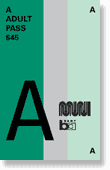Senior/disabled/youth fare increase “off table” – but we still urge NO vote
 SF Streetsblog reports today that SFMTA is unlikely to approve increases to senior, youth, and disabled Fast Pass fares in tomorrow’s meeting, but that proposals to extend meter hours and operate parking meters on Sunday are also not likely to be considered, so Rescue Muni still urges the MTA to reject the proposal. If you can speak at tomorrow’s meeting, please do.
SF Streetsblog reports today that SFMTA is unlikely to approve increases to senior, youth, and disabled Fast Pass fares in tomorrow’s meeting, but that proposals to extend meter hours and operate parking meters on Sunday are also not likely to be considered, so Rescue Muni still urges the MTA to reject the proposal. If you can speak at tomorrow’s meeting, please do.
Meanwhile, Supervisor Elsbernd’s proposed amendment appears to be gaining momentum. The Chronicle’s CW Nevius covers it today. It would remove the wage floor for operators set in Proposition A (2007) and require that operators collectively bargain for wages, hours, work rules, and benefits, just as other MTA and city workers do.
In view of the already packed to capacity buses on some crosstown routes (like the 22 Fillmore and 24 Divisadero) it’s insane to consider service reductions during peak hours. Some of the rides I’ve been on have already been skipping stops leaving people trying to get to work or school stranded and probably late. Yes, change the work rules, but at least for now get Muni management to reconsider some of the important details.
I have been riding Muni (unsupervised) for 60 years, and driving in SF for more than 50, so I have a longer perspective than most on both forms of transportation. My student car ticket was $0.25 for ten rides on Muni; my first adult fast pass cost $11. I now pay $15. One can easily spend that much for lunch. In relative terms my senior pass is less than my youth fare. If you consider the printing and administrative costs, the senior pass may cost Muni money. No wonder we can’t Rescue Muni.
Rescue Muni should not fight fare increases. Keeping fares low will not rescue Muni and may be counterproductive. It is true than ridership drops off after a fare increase just as a rise in the price of gasoline sees less driving. Fewer riders make Muni faster and more comfortable and fewer drivers make driving easier. Unfortunately, both are temporary and eventually things return to normal after people adjust.
Cost is a factor in deciding whether to drive or take Muni but not the primary factor. Raising the fare will not put people back in their cars unless the fare gets very much higher than a $70 fast pass. And many SF employees get transit checks from their employer so the pass is free. Low fares will not get people out of their cars. Most drivers could save a bundle now if they took Muni. It is not low fares but a fast, reliable, safe Muni will get people out of their cars. If we want to rescue Muni we have to pay for it.